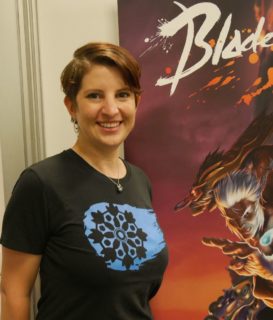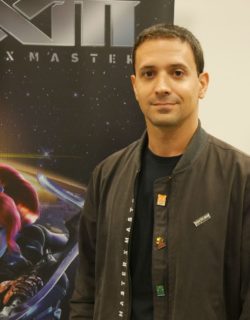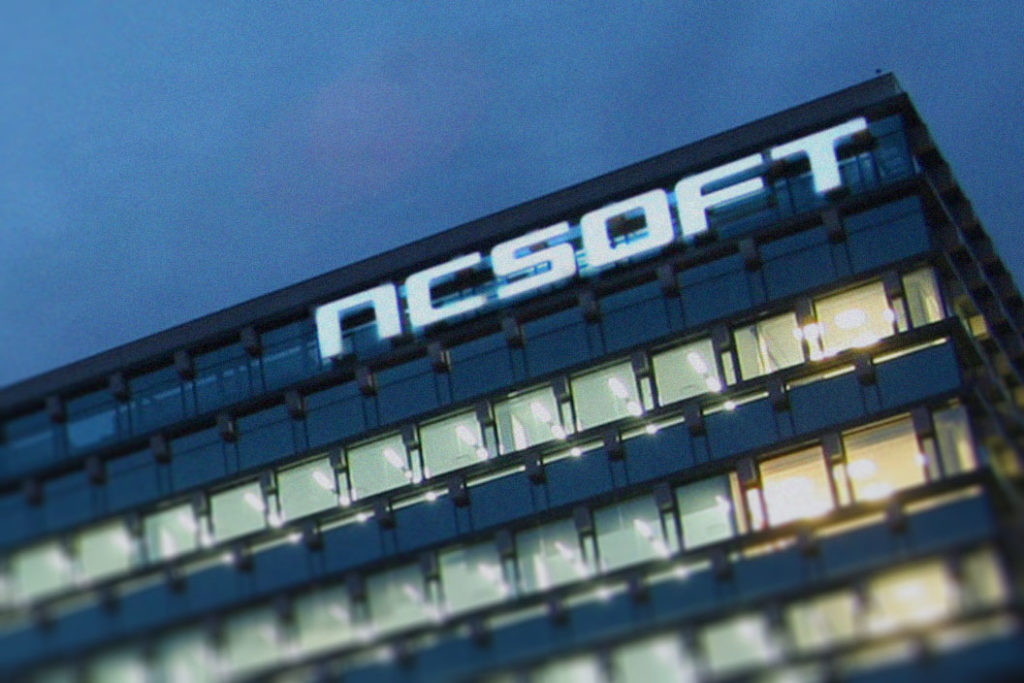With hundreds of thousands of fans in South Korea and Asia, Blade & Soul is one of NCsoft’s biggest esports games. The company is primarily known for publishing MMO games, particularly Lineage and Lineage II, and it has worked with Western developers such as ArenaNet to promote Guild Wars 2 as an esport, but Blade & Soul was developed internally and it has proven to be a very special case. The fast-paced free-to-play MMORPG, which has a story that’s heavily rooted in Wushu martial arts and Asian themes, launched in S. Korea in 2012 unexpectedly became a tremendous esports hit. The game released in the West early last year and since then, NCsoft has been releasing content updates to catch the Western version of it up with its Korean counterpart.

“The play styles of the two regions are slightly different,” Julianne Harty, esports manager at NCsoft told AListDaily, comparing the Eastern and Western Blade & Soul players. “One of the things we identified very early on was understanding the differences between the Western and Eastern play styles. Koreans tend to play a very cautious and defensive game while North Americans are very aggressive.”
Blade & Soul marks NCsoft’s first step in growing its esports brand in the West, which is continued by the launch of Master X Master (MXM), a free-to-play MOBA game with a tag team mechanic, this week. But unlike all other internally developed NCsoft games, MXM is designed from the ground up with esports in mind and it is launching first in the West before coming to Asia.
The first North American Blade & Soul Invitational Tournament will take place on June 24 and 25, which is tied in with NCsoft’s global esports initiative. It is an online competition that will include the top 12 teams from the past season’s esports championships. Additionally, there will be Wildcard Tournaments in July in both Europe and North America. Wildcard winners will automatically make their way to the regional championships, which will be held at Gamescom in Europe and PAX West in North America. Those winners, in turn, will move on to the world championships.
Ben Conrad, senior director of communications at NCsoft, added that “one of the interesting things about the launch of Blade & Soul is that there were so many excited people for the title. There is a huge and passionate community that watched the success of the game in Asia and wanted it here in the West. It was one of the driving factors that helped it be so successful. We had over four million registered players on Blade & Soul within the first year, which is a very significant and rapid show of success for the game.”
Conrad also said that Asian Blade & Soul esports tournaments are very close and competitive, stating that “you can hear the audience suck in a breath, and that kind of intensity helped build excitement for an audience.”
Harty explained why she thought Blade and Soul caught on so quickly—so much so that it practically had a built-in audience when it released in the West. “I think it occupied a very new space in the MMO area,” said Harty. “It has a pure action combat system that differs from more Western style MMOs like World of Warcraft and Guild Wars. It eschewed a lot of the traditional combat styles so that you’re actively blocking and avoiding hits as a martial artist, dealing damage, and working in teams to understand the mechanics of the game rather than relying on roles to help you through the system. It’s a visceral combat experience that people have universally said is fantastic and it’s a flavor that our players find very appealing. Also, people know when a big play happens and when someone tags in. With all the people cheering, it’s hard to not get caught up in the excitement.”
When asked whether success in S. Korea and Asia usually helped pave the way for growth and adoption in the West, Harty said, “In my opinion, yes. It can be argued that the reason why League of Legends, StarCraft and various other titles got their foothold in the West was because Korea picked it up first. They showed the potential for the games at a competitive level and the internet and livestreaming made viewing those games more accessible, so our success in Asia lends itself to a good foothold here in the United States.”
That being said, it’s strange that MXM is following the reverse strategy by launching in the West first before moving to Asia. Sean Orlikowski, brand manager at NCsoft, told AListDaily that the reason for this shift is because two of the main game modes—5v5 competition and PVE cooperative play—are very popular in the West.
“Releasing here is strategic, and it is also to gather feedback,” said Orlikowski. “Our players have been great with giving us feedback. We’ve had players resonate positively with both the PVE side and with the 5v5 and it’s been a very even split between what modes people are playing.” Orlikowski also stated that NCsoft is very excited to have MXM be one of its first in-house games to launch in the West first.
“From a more strategic perspective, you shouldn’t be surprised to see more titles release in the West first,” Conrad added. “Not all, but it will not be as rare as it has been.”

“MXM is an action game at its core—it is built to be fun, fast and furious,” said Orlikowski, describing how the game would match up against established MOBA titles such as League of Legends and Dota 2. “The MOBA mode is just one aspect of it, and that’s a very congested genre. We’re not out to claim that we’re better than anybody—we’re just trying to be the best game that we can and offer something different. We’re doing that with multiple game modes, mini-games and PVE. One thing that I personally love is that we’ve added a social aspect to the game. We have a lobby system where people can interact with each other’s characters instead of looking at a list of people in a launcher before playing. You can sit and chat with people. We’ve had dance parties break out to someone’s favorite song on the jukebox, and conga lines have formed. People are having fun even though they’re not in any of our designed game modes. It’s a great community building aspect of the game.”
Orlikowski believes that emphasizing the game’s social aspects will go a long way toward growing its player base. “NCsoft has primarily been an MMO company. MXM is something new for us, and we’re really excited to branch out. I think that showing people that you can still have a social and fun experience, no matter what game mode you play, will be a nice tie that binds people from other games.”
We asked Orlikowski how MXM fit in with NCsoft’s catalogue of games, which have traditionally been very MMO-focused. Blade & Soul is, at its core, an MMO and even MXM has a very popular cooperative action role-playing component. “In general, I feel like MXM is a celebration of NCsoft’s 20 years, and it’s very fortuitous timing that it’s coming out on our 20th anniversary. We have a rich history of characters and games that we’ve put into MXM. There are characters from Blade & Soul, Guild Wars 2, Aion, Lineage and Lineage II. We’ve even made PVE stages that are modeled after our different games to unlock those characters. Most the characters and scenarios in MXM are brand new, but we’ve also brought this rich history into it.”
Chauncey Gammage, NCsoft’s SVP of human resources, was also on hand to comment about the company’s brand strategy moving forward.
“NCsoft sees itself as a global games company,” said Gammage. “We want to release titles on a global scale so that we can close gaps like the one we experienced with Blade & Soul when we launched it in North America. We want to have global launches, and this [MXM launch] helps us learn using mechanisms for feedback during the development process to make sure our games have the best opportunity to succeed in every market they’re going into.
“[Furthermore], NCsoft will continue to evolve as a multi-genre game company. You saw this with the opening of our mobile studio in San Mateo, California, and we’ll be excited to talk about those games when they come out. We love our rich DNA of MMORPGs, but we believe we’re growing and expanding to reach players in many different ways across many different types of games.”

